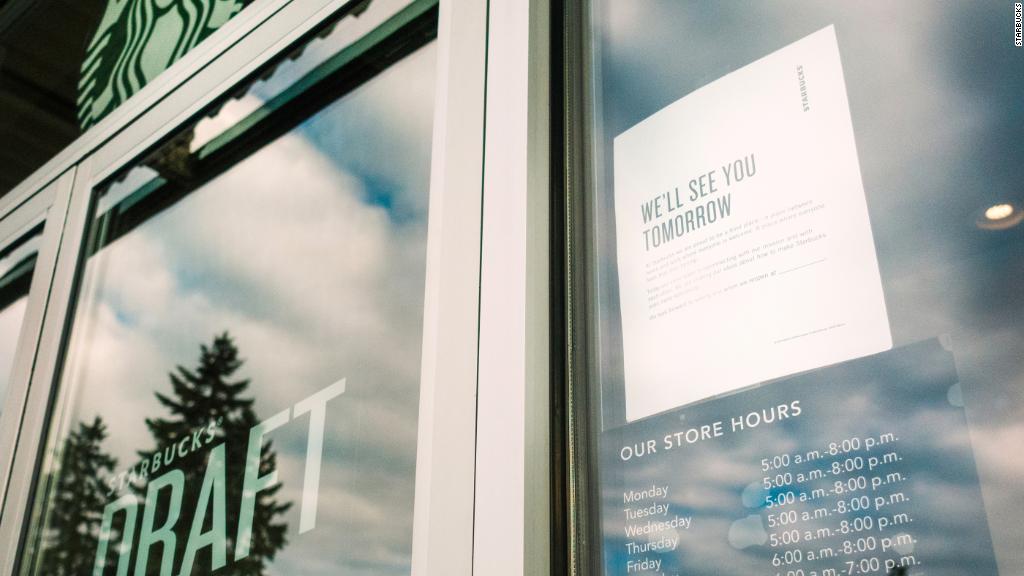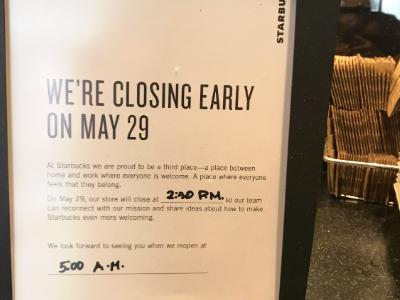
Starbucks will close about 8,000 company-owned locations on Tuesday afternoon to offer 175,000 employees a mandatory anti-bias training.
Most of the 7,000 licensed stores, including those operated by hotels, grocery stores and airports, should be open. Participating stores will close around 2 p.m. to 3 pm, local time. Here's what you need to know.
Why is Starbucks doing this? Starbucks (SBUX) announced the training soon after two black men were arrested at a Philadelphia Starbucks in April.
A store manager called the police because the men were sitting in the store without placing an order. They were arrested for trespassing. The men, who had previously asked for the code needed to use the store's bathroom, said they were waiting for a friend.

Related: Starbucks will close 8,000 US stores May 29 for racial-bias training
The incident sparked an outcry, and CEO Kevin Johnson swiftly apologized and promised to make sure that nothing like that would happen at a Starbucks again. The anti-bias training is one step toward making good on that promise.
What's happening on Tuesday? Plans for the afternoon session are elaborate.
Workers at each location will break into small groups to learn together. Starbucks Chairman Howard Schultz, Johnson and musician and activist Common will serve as virtual guides. Employees will talk about their own experiences, and watch a film about bias.
The company explained that each store will get a tool kit to help guide the trainings. Tuesday's session will focus on understanding both racial bias and the history of racial discrimination in public spaces in the United States.
Related: How Starbucks will train its staff to be less biased
Starbucks tapped several experts and researchers to help develop the curriculum, including Sherrilyn Ifill, president and director-counsel of the NAACP Legal Defense and Education Fund and Heather McGhee, president of the public policy organization Demos.
Ifill and McGhee, who both served as unpaid advisers, told reporters on a media call on Thursday that they think Starbucks' plan is ambitious.
What else is Starbucks doing? The company has also changed its policy to allow people to use Starbucks' restrooms and spend time in stores, even if they haven't made any purchases. There are limits, however, and employees will still have to use their discretion. Starbucks is asking customers to behave in a way that "maintains a warm and welcoming environment." If customers are disruptive, employees have been advised to step in.
The company offered specific guidelines in a document shared with workers. The list of inappropriate behaviors includes smoking, using drugs or alcohol, sleeping or improperly using the restroom. Starbucks added that if employees see customers who are unreasonably loud, watching something inappropriate on a personal device or disrupting others with their personal hygiene, they should step in.
Related: Starbucks' new all-are-welcome policy: Now what?
Starbucks advises employees to consider whether they'd be disturbed by the behavior in question if it was coming from a different customer. It also suggests that they consult colleagues to see if they agree the person is being disruptive. If so, employees are instructed to approach the customer and respectfully ask him or her to cease the offensive action while another employee watches. If a Starbucks employee thinks the situation isn't safe, he or she should call the police.
The company is reviewing other policies, as well, and Starbucks management received a version of the bias training this week, Ifill told reporters.
What's next? More trainings will follow, though it's unclear if stores will be closed again. And in the next few weeks, Ifill and McGhee will issue a report outlining a comprehensive set of issues they believe the company must address.
They said they hope Starbucks will incorporate anti-bias training into its employee onboarding process to make sure that every employee is trained. They'll also be evaluating the trainings on Tuesday to see how workers respond. The advisers plan to hold Starbucks to a rigorous standard. "We've made it clear that we won't be a rubber stamp to validate their programming," McGhee said.
The company plans to share its materials with the public after the training, and hopes that other businesses will make use of the tools in their own workplaces. It will share more information on Wednesday.

